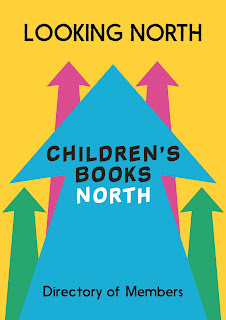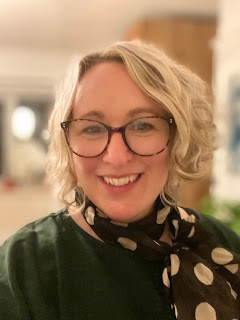Special Guest Northern Highlight - Mairi Kidd, Seven Stories
SPECIAL GUEST NORTHERN HIGHLIGHT
Mairi Kidd, Seven Stories - The National Centre for Children's Books
Seven Stories was founded
as a charity in 1996 by Elizabeth Hammill OBE and Mary Briggs OBE. They
recognised that Britain needed an institution whose mission was to collect,
champion and celebrate its children's literature. They believed that it should
be founded in a place where it could make a real difference to the children and
families living nearby, knowing that early experience of books and stories is
vital to childhood development and raising aspiration.
In the 1990s the original
manuscripts and illustrations of some of Britain's influential authors were
being sold to overseas collectors and institutions. There was nowhere in
Britain that saw its role as protector of our literary heritage for children.
Mary and Elizabeth set out, with the help of many authors, illustrators,
publishers, teachers and librarians, to found such a national centre for
children's books. In 2002 the charity purchased a building in the Ouseburn
Valley, an area of cultural regeneration about ½ mile from
Newcastle's city centre. The seven storied Victorian building is listed
but was semi-derelict at the time of purchase and needed substantial repair to
make it fit for thousands of visitors. Seven Stories was opened to the public
by Children's Laureate Dame Jacqueline Wilson and Nick Sharratt on 19th August
2005. National status was awarded at the end of 2012 through Arts Council
England's accreditation scheme, recognising excellence in caring for literary
heritage and engaging visitors in children's literature through the quality of
exhibitions, events and learning programmes. And finally, in 2020, Seven
Stories celebrated its 15th birthday!
Tell
us about where you are in Newcastle.
Seven Stories is housed in
a converted Victorian warehouse in the Ouseburn Valley in Newcastle upon
Tyne. The building offers visitors seven floors of galleries, creative
spaces, a specialist independent children's bookshop and a café to
explore. The Ouseburn is one of the most vibrant creative communities that
exists in the North East and its sheer eclecticism is its selling point. By
day, it's home to a city farm, the UK's largest independent commercial gallery,
a leading printmaking space, a preserved 19th-century waggonway, and - of
course - The National Centre of Children's Books. By night, its a place to
experience live music and explore a string of pubs and breweries. It's an
exciting place; one that nods towards its rich industrial heritage whilst being
firmly rooted in regeneration, future change and creativity.
Seven
Stories activity also extends into communities and schools across the UK
through a wide range schools programmes, touring exhibitions and outreach projects.
 |
| A Seven Stories 'Story Catcher' storytelling in their magical attic space |
What
are your aims for Seven Stories?
My overarching aim for
Seven Stories is to make sure the amazing work of the organisation reaches many
more children and families, writers and illustrators working today and the
storytellers of the future, inspiring them to navigate the world with
imagination, empathy and curiosity. Our children's literature is one of the
UK's treasures and we shout about it so little; in many ways it's the
Cinderella of the book world. I can't wait to help fly the flag.
 |
| The Seven Stories building |
What for you is the 'spirit of the North'?
As a Scottish person, that
sounds to me like a marketing slogan for a whisky company! I would query the
idea of there being one 'spirit of the North' in the first place - I think that
could be quite reductive. The North - which as defined by this blog includes a
big swathe of England and the whole country of Scotland - is a hugely diverse
place. Culturally, linguistically, socially, politically - does Shetland have
the same 'spirit' as Sheffield? I'm not sure. Is the North static, or does it
continually evolve to welcome new communities, respond to political and social
realities and engage in the same way as we all do with global culture from our
own local perspectives? l think it does. I am a little worried the question
comes from a desire to parcel the North up for marketing purposes - back to the
whisky slogan - and I don't think the North needs pigeonholing in that way. If
the book world thinks it does, I would politely suggest the book world could do
better...
Who for you are the great
Northern writers or illustrators?
I love Alan Garner's
writing and in particular The Owl Service - which rather goes to illustrate my
point about not pigeonholing the North, given that it's a fantasy with a solid
grounding in Welsh politics and mythology. David Almond is an author who shows
us over and over that a solid grounding in place is no barrier to soaring
vision. Anthony McGowan is another favourite, as is Phil Earle and Melvin
Burgess - I've had the privilege of publishing all three of them in my time
(and David too). I've also published Chris Mould, whose work I love - give me
an inky black, hand-drawn line and a dollop of Gothic any day. In picture books, I love Cat Rayner, who is a member of the same print studio in Edinburgh as me
and any time I'm in I hold my breath in hope I might spot some of her work on
the drying racks.
 |
| David Almond in his retrospective exhibition held at Seven Stories |
I think that's a simple
question of equality of opportunity and diversity of voice. Publishing as an industry
has a global centre of gravity in London and for that reason and others, there
is a tendency for the vast majority of opportunities to be clustered there.
That's a barrier in many ways - because London is a vastly expensive place to
live, because it can be challenging for many people in other ways (the Tube on
a wheelchair, anyone?) and because fundamentally it doesn't follow that in
order to be involved in the business of telling stories people should want to
leave their own communities and go somewhere else. And expecting everyone to
converge in one place is not, I would suggest, in any way conducive to
representing diversity of experience on the page.
What would you like to see
from children's publishing in the North?
The same things I'd like
to see from all publishing. Creative risk-taking - a belief in books rather than brands. A commitment to
diversity of voice, which goes hand-in-hand with a commitment to supporting
writers properly. And a commitment to reaching more readers. A fairly large
wish-list that challenges many of the accepted ways of doing things in the
industry, I know!
You can follow Mairi on Twitter






Comments
Post a Comment